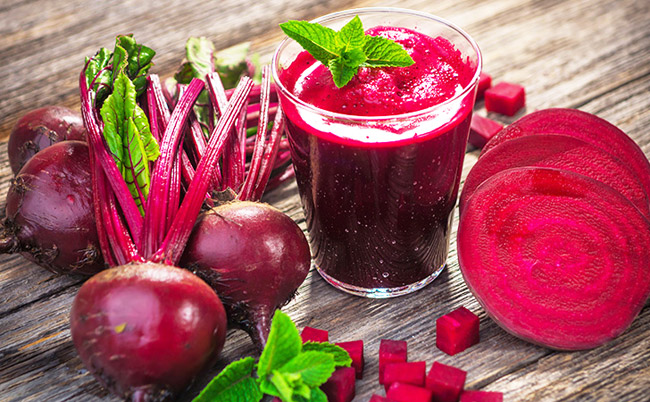
Beets are an extremely nutritious food choice that just happens to be tasty and delicious – which can be eaten raw, cooked and even consumed in form of juice.
Potassium, magnesium, fiber, phosphorus, iron; vitamins A, B & C; beta-carotene, beta-cyanine; folic acid. These are but a few of the many nutrients, vitamins and minerals that can be found in beets and beet greens. Beets are particularly beneficial to women whom are pregnant, as the vitamin B and iron are very beneficial to new growth cells during pregnancy and replenishing iron in the woman’s body.
It is low in calories and high in sugar (although the sugar is released into your system gradually, as opposed to chocolate). They are a wonderful addition to any dietary need. With their high volume of nutrients, delicious taste, and multitude of uses, anyone can jump right into beets without missing a beat.
A research into the health benefits of beetroot juice suggests its not only athletes who can benefit from its performance enhancing properties its physiological effects could help the elderly or people with heart or lung-conditions enjoy more active lives. As you get older, or if you have conditions which affect your cardiovascular system, the amount of oxygen you can take in to use during exercise drops considerably. This means that, for some people, even simple tasks like walking may not be manageable. When consumed, beetroot juice has two marked physiological effects. Firstly, it widens blood vessels, reducing blood pressure and allowing more blood flow. Secondly, it affects muscle tissue, reducing the amount of oxygen needed by muscles during activity. The combined effects have a significant impact on performing physical tasks, whether it involves low-intensity or high-intensity effort.
A well-conducted review on nitrate supplementation in 2013 looked at research linking beetroot juice to improved exercise performance. The review found that inactive and recreationally active individuals saw “moderate improvements” in exercise performance from drinking beetroot juice. However, the review noted there was very little effect on elite athletes. The small positive effect on time trial or graded exercise performance may be meaningful in an elite sport context.
Beetroots are high in fibers and low in calories. It is popularly used in weight loss diet due to the soluble fibers present in it that helps to fight against fat. Beetroot also helps to cleanse the toxic and excess water from the body. Thus we can say that beetroot nutrition helps skin glow.
A fantastic source of the antioxidant resveratrol, which is thought to help combat against age- related infertility, beetroots are also rich in nitrates. These are well known to improve blood flow and are often used by athletes for this purpose. I particularly recommend beetroot juice for women undergoing IVF treatment as a way to improve blood flow to the uterus to help with embryo implantation. Beets contain high amounts of boron, which is directly related to the production of human sex hormones.
Antioxidants are essential to support the immune system. Colourful fruits and vegetables are said to contain antioxidant properties, beetroot being red in colour contains beta cyanine, a very good antioxidant and can reduce LDL, also known as bad cholesterol.
Drinking beetroot juice increases blood flow to the brain in older people, which may be able to fight the progression of dementia, a 2010 study suggested. Beetroot contains high concentrations of nitrates, which are converted into nitrites by bacteria in the mouth. Nitrites help open blood vessels in the body, increasing blood flow and oxygen to places lacking in oxygen. Previous studies have shown that nitrites widen blood vessels, but US researchers writing in Nitric Oxide: Biology and Chemistry, the peer-reviewed journal of the Nitric Oxide Society, say theirs was the first to find that nitrites also increase blood flow to the brain.
In 2010, UK researchers revealed that nitrate is the special ingredient in beetroot which lowers blood pressure and may help to fight heart disease. In a Queen Mary University of London study, healthy participants had to drink a glass of beetroot juice while others had a dummy (placebo) drink. Blood pressure was lowered within 24 hours in people who took nitrate tablets and those who drank beetroot juice.
Beets are also one of the richest sources of glutamine, an amino acid, essential to the health and maintenance of the intestinal tract. Glutamine plays an important role in maintaining balance of the body’s acid-base ratio. This amino acid is used to remove excess ammonia, a toxic waste product of deamination reactions. Glutamine enables toxic ammonia to be removed in the kidneys and connected to acids before it is excreted. Glutamine is also required for the production of other substances in the body such as glucose or other amino acids.
Though available year round, beets are sweetest and most tender during their peak season, from June to October.

